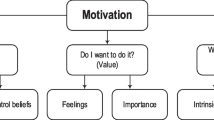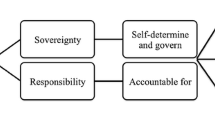Abstract
Starting from problems of knowledge application in the context of vocational school training in business administration, an instructional approach based on worked-out examples was developed. The effectiveness of additional instructional measures (e.g. an elaboration training) was investigated experimentally. Together with teachers, the approach was adapted to conditions of regular book-keeping lessons at vocational school; then it was implemented and evaluated in practice. The positive results of the first evaluation study in which applicable knowledge was fostered were replicated in additional evaluation studies in which some aspects of the approach were optimised. The main results of the evaluation studies underline the effectiveness of example-based learning and teaching. Furthermore they show that this approach can be transferred successfully to vocational school lessons. In the general discussion, recommendations for further improving and successfully implementing example-based lessons are given.
Similar content being viewed by others
REFERENCES
Anderson, J. R. (1993). Rules of the mind. Hillsdale, NJ: Erlbaum.
Brown, A. L. (1992). Transforming schools into communities of thinking and learning about serious matters. American Psychologist, 4, 399–413.
Chi, M. T. H., Bassok, M., Lewis, M. W., Reimann, P., & Glaser, R. (1989). Self-explanations: How students study and use examples in learning to solve problems. Cognitive Science, 13, 145–182.
Cognition and Technology Group at Vanderbilt (1992). The Jasper series as an example of anchored instruction: Theory, program description, and assessment data. Educational Psychologist, 27, 291–315.
Cognition and Technology Group at Vanderbilt (1997). The Jasper project: Lessons in curriculum, instruction, assessment, and professional development. Mahwah, NJ: Erlbaum.
Collins, A., Brown, J. S., & Newman, S. E. (1989). Cognitive apprenticeship: Teaching the crafts of reading, writing and mathematics. In L. B. Resnick (Ed.), Knowing, learning, and instruction (pp. 453–494). Hillsdale, NJ: Erlbaum.
Cooper, G., & Sweller, J. (1987). Effects of schema acquisition and rule automation on mathematical problem-solving transfer. Journal of Educational Psychology, 4, 347–362.
De Jong, T., & Ferguson-Hessler, M. G. M. (1996). Types and qualities of knowledge. Educational Psychologist, 31, 105–113.
Dweck, C. S. (1991). Self-theories and goals: Their role in motivation, personality, and development. In R. A. Dienstbier (Ed.), Nebraska symposium on motivation: Vol. 38. Perspectives on motivation (pp. 199–235). Lincoln, NE: University of Nebraska Press.
Hinkofer, L. (2003). Konzeption und erprobung von unterrichtssequenzen an der kaufmännischen berufsschule auf der basis eines beispielbasierten Instruktionsansatzes [Conception and evaluation of lesson sequences at vocational school of business administration on the basis of an example-based instructional approach]. Unpublished doctoral thesis, University of Munich, Germany.
Jürgen-Lohmann, J., Borsch, F., & Giesen, H. (2002). Kooperativer unterricht in unterschiedlichen schulischen lernumgebungen [Cooperative instruction in different school environments]. Unterrichtswissenschaft, 30, 367–383.
Paas, F. G. W. C. (1992). Training strategies for attaining transfer of problem-solving skill in statistics: A cognitive-load approach. Journal of Educational Psychology, 84, 429–434.
Palincsar, A. S., & Brown, A. L. (1984). Reciprocal teaching of comprehension-fostering and comprehension-monitoring activities. Cognition and Instruction, 1, 117–175.
Reimann, P. (1997). Lernprozesse beim wissenserwerb aus beispielen [Learning processes in the context of example-based knowledge acquisition]. Berne, Swizterland: Huber.
Reinmann-Rothmeier, G., & Mandl, H. (1998). Wenn kreative ansätze versanden: Implementation als verkannte aufgabe [When creative approaches fail: Implementation as an underestimated problem]. Unterrichtswissenschaft, 26, 292–311.
Reinmann-Rothmeier, G., & Mandl, H. (2001). Unterrichten und lernumgebungen gestalten [Teaching and designing learning environments]. In A. Krapp & B. Weidenmann (Eds.), Pädagogische psychologie: Ein lehrbuch (pp. 601–646). Weinheim, Germany: Beltz.
Renkl, A. (1997). Learning from worked-out examples: A study on individual differences. Cognitive Science, 21, 1–29.
Renkl, A. (2001). Explorative analysen zur effektiven nutzung von instruktionalen erklärungen beim lernen aus lösungsbeispielen [Explorative analyses for the effective use of instructional explanations in the context of learning by worked-out examples]. Unterrichtswissenschaft, 29(1), 41–63.
Renkl, A. (2002). Worked-out examples: Instructional explanations support learning by self-explanations. Learning and Instruction, 5, 529–556.
Renkl, A., Atkinson, R. K., Maier, U. H., & Staley, R. (2002). From example study to problem solving: Smooth transitions help learning. Journal of Experimental Education, 70, 293–315.
Renkl, A., Gruber, H., Mandl, H., & Hinkofer, L. (1994). Hilft wissen bei der identifikation und kontrolle eines komplexen ökonomischen systems? [Does knowledge support the identification and control of a complex economic system?] Unterrichtswissenschaft, 3, 195–202.
Renkl, A., Stark, R., Gruber, H., & Mandl, H. (1998). Learning from worked-out examples: The effects of example variability and elicited self-explanations. Contemporary Educational Psychology, 23, 90–108.
Salomon, G., & Globerson, T. (1987). Skill may not be enough: The role of mindfulness in learning and transfer. International Journal of Educational Research, 11, 623–637.
Schommer,M. (1990). Effects of beliefs about the nature of knowledge on comprehension. Journal of Educational Psychology, 82, 492–504.
Schommer, M. (1993). Epistemological development and academic performance among secondary students. Journal of Educational Psychology, 85, 406–411.
Spiro, R. J., Feltovich, P. J., Jacobson, M. J., & Coulson, R. L. (1991). Cognitive flexibility, constructivism, and hypertext: Random access instruction for advanced knowledge acquisition in ill-structured domains. Educational Technology, 31(5), 24–33.
Stark, R. (1999). Lernen mit lösungsbeispielen [Learning by worked-out examples]. Göttingen, Germany: Hogrefe.
Stark, R. (2001). Analyse und förderung beispielbasierten lernens-anwendung eines integrativen forschungsparadigmas [Analysing and fostering example-based learning-application of an integrative research paradigm]. Unpublished professorial dissertation, University of Munich, Germany.
Stark, R., Gruber, H., Mandl, H., & Hinkofer, L. (2001). Wege zur optimierung eines beispielbasierten instruktionsansatzes: Der einfluss multipler perspektiven und instruktionaler erklärungen auf den erwerb von handlungskompetenz [Optimising an examplebased instructional approach: Influence of multiple perspectives and instructional explanations on the acquisition of action competence]. Unterrichtswissenschaft, 29, 26–40.
Stark, R., Gruber, H., Renkl, A., & Mandl, H. (2000). Instruktionale effekte einer kombinierten lernmethode: Zahlt sich die kombination von lösungsbeispielen und probleml öseaufgaben aus? [Instructional effects of a combined learning method: Does the combination of worked-out examples and problem-solving tasks pay off?]. Zeitschrift f¨ur Pädagogische Psychologie, 14, 206–218.
Stark, R., Mandl, H., Gruber, H., & Renkl, A. (1998). Indeed, sometimes knowledge does not help: A replication study. Instructional Science, 26, 391–407.
Stark, R., Mandl, H., Gruber, H., & Renkl, A. (1999). Instructional means to overcome transfer problems in the domain of economics: Empirical studies. International Journal of Educational Research, 31, 591–609.
Sweller, J., Van Merrienboër, J. J. G., & Paas, F. G. W. C. (1998). Cognitive architecture and instructional design. Educational Psychology Review, 10, 251–296.
VanLehn, K. (1996). Cognitive skill acquisition. Annual Reviewof Psychology, 47, 513–539.
Van Merrienboër, J. J. G., & De Croock, M. B. M. (1992). Strategies for computer-based programming instruction: Program completion vs. program generation. Journal of Educational Computing Research, 8, 212–234.
Whitehead, A. N. (1929).The aims of education.New York: Macmillan.
Author information
Authors and Affiliations
Rights and permissions
About this article
Cite this article
Stark, R. Implementing Example-Based Learning and Teaching in the Context of Vocational School Education in Business Administration. Learning Environments Research 7, 143–163 (2004). https://doi.org/10.1023/B:LERI.0000037197.78134.cd
Issue Date:
DOI: https://doi.org/10.1023/B:LERI.0000037197.78134.cd




